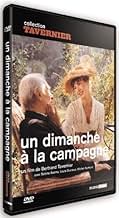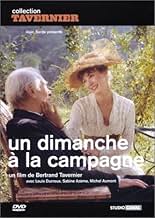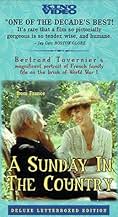CALIFICACIÓN DE IMDb
7.4/10
3.4 k
TU CALIFICACIÓN
Un anciano pintor cuyo hijo visita a su familia los fines de semana, también se ve sorprendido por la visita de su hija, aún soltera.Un anciano pintor cuyo hijo visita a su familia los fines de semana, también se ve sorprendido por la visita de su hija, aún soltera.Un anciano pintor cuyo hijo visita a su familia los fines de semana, también se ve sorprendido por la visita de su hija, aún soltera.
- Dirección
- Guionistas
- Elenco
- Nominada a1 premio BAFTA
- 13 premios ganados y 12 nominaciones en total
Sabine Azéma
- Irène
- (as Sabine Azema)
Geneviève Mnich
- Marie-Thérèse
- (as Genevieve Mnich)
- Dirección
- Guionistas
- Todo el elenco y el equipo
- Producción, taquilla y más en IMDbPro
Opiniones destacadas
I saw this film sixteen years ago, at a time when I did not see many 'filmhouse' movies yet. It made a strong impression on me, I wasn't used to so many 'open spaces' in films, which spectators have to fill according to their own ideas. Later I understood that once you start filling these 'holes' with pieces of yourself, the film becomes much more personal.
From time to time I think back to this film, like I did just now when I looked it up in the IMDB. Its storytelling, or rather story-hinting, is apparently so strong that even after sixteen years I am looking for some answers to the questions that the film raises.
In short: go see it.
From time to time I think back to this film, like I did just now when I looked it up in the IMDB. Its storytelling, or rather story-hinting, is apparently so strong that even after sixteen years I am looking for some answers to the questions that the film raises.
In short: go see it.
I saw this film many years ago and loved it and just rewatched it again, this time, on DVD with Bertrand Tavernier's commentary. I must say that I love it now even more. The two words that permeate throughout his film rhythm and time. It is strange to me that he does not say that impressionism was a major inspiration in the work, in fact he says the contrary. Yet I've noticed many films where the director meant to do something only it was taken very differently by the viewers and I guess this was such a case.
Anyway to get back to the film, in hearing Tavernier's commentary, I now realize how musical the whole film is, it's lazy, Sunday tone, then Irene (Azema) coming in like a tornado, then quiet conversations, then someone getting stuck in a tree, then another quiet conversation, then a dance...a series of stop starts that lulls you in its rhythm, but awakens you again with bursts of life and vitality.
In speaking of time and the passage of it, Tavernier encapsulates the life of Mr. Lamiral in one Sunday afternoon, and all the bittersweet sadness, through his relationship with his children, grandchildren, maid and himself through his actions and voiceovers made by an all knowing narrator.
I feel a sense of pride that Tavernier points out in his commentary the poignant scenes which I was so touched by in the first viewing. The scene where Irene tells herself that her niece would die young, the scene where Irene and her father speak of painting, The narrator supplying profound insights on M. Ladmiral about his indifference to his grandchildren. Gonzague's and his wife's decency, but utter clumsiness, living a life bounded by convention and security.
I also learned so much about camera movement through Tavernier. He describes not only the how, but why certain shots are shot they are and you begin to understand why certain scenes provoke certain emotions not only through dialogue and setting, but also how you hear something and see something. One scene where Gonzague and his wife are having an argument and M. Ladmiral comes into the scene but rather than say a word to interrupt, he concludes to himself that it is pointless and leaves the scene without uttering a word. Such a scene tells so much, the relationship of the couple, the father's relationship with the couple, and the father's relationship with himself, all in the frame of a 5 second shot. I'm grateful to M. Tavernier for having created such a beautiful film and added such brilliant insight on the nature of this work.
Anyway to get back to the film, in hearing Tavernier's commentary, I now realize how musical the whole film is, it's lazy, Sunday tone, then Irene (Azema) coming in like a tornado, then quiet conversations, then someone getting stuck in a tree, then another quiet conversation, then a dance...a series of stop starts that lulls you in its rhythm, but awakens you again with bursts of life and vitality.
In speaking of time and the passage of it, Tavernier encapsulates the life of Mr. Lamiral in one Sunday afternoon, and all the bittersweet sadness, through his relationship with his children, grandchildren, maid and himself through his actions and voiceovers made by an all knowing narrator.
I feel a sense of pride that Tavernier points out in his commentary the poignant scenes which I was so touched by in the first viewing. The scene where Irene tells herself that her niece would die young, the scene where Irene and her father speak of painting, The narrator supplying profound insights on M. Ladmiral about his indifference to his grandchildren. Gonzague's and his wife's decency, but utter clumsiness, living a life bounded by convention and security.
I also learned so much about camera movement through Tavernier. He describes not only the how, but why certain shots are shot they are and you begin to understand why certain scenes provoke certain emotions not only through dialogue and setting, but also how you hear something and see something. One scene where Gonzague and his wife are having an argument and M. Ladmiral comes into the scene but rather than say a word to interrupt, he concludes to himself that it is pointless and leaves the scene without uttering a word. Such a scene tells so much, the relationship of the couple, the father's relationship with the couple, and the father's relationship with himself, all in the frame of a 5 second shot. I'm grateful to M. Tavernier for having created such a beautiful film and added such brilliant insight on the nature of this work.
I think this film can be appreciated on several levels. For some viewers, this is just a happy family portrait, reflecting a more peaceful time and recalling one's own memories of family outings and quiet Sunday afternoons. I think this point of view is mistaken, but I can see why people feel this way. The film is externally slow- moving and peaceful, like a sunny river. But like a river, there are strong currents lurking, invisible, under the surface -- currents that cannot be seen, but only observed indirectly from their effects.
There's a lot more going on here than just ninety minutes of bucolic peacefulness. Pay attention to the details, the small looks and gestures, the things said and things left unsaid. You can almost see the fine strands that link the characters, like a spiderweb, where each character's movements are felt by all the others. The role of the narrator, often disparaged in film, is used effectively here, giving the film a somewhat novel-like quality and reminding the viewer of their presence as an observer.
There's more to be said about this film, but I don't feel quite up to it. In any case, the real meaning of the film can't easily be described in words -- which is a good thing, or the film would be unnecessary. So watch the film yourself, if you haven't already, and see what you think.
There's a lot more going on here than just ninety minutes of bucolic peacefulness. Pay attention to the details, the small looks and gestures, the things said and things left unsaid. You can almost see the fine strands that link the characters, like a spiderweb, where each character's movements are felt by all the others. The role of the narrator, often disparaged in film, is used effectively here, giving the film a somewhat novel-like quality and reminding the viewer of their presence as an observer.
There's more to be said about this film, but I don't feel quite up to it. In any case, the real meaning of the film can't easily be described in words -- which is a good thing, or the film would be unnecessary. So watch the film yourself, if you haven't already, and see what you think.
A lot of people consider it Tavernier's best .
An old man lives in the country in a desirable property.He waits for his children's visit .Whereas his son ,Gonzague,who lives a bourgeois life with wife and kids frequently turns up,his daughter Irene , a socialite ,a woman ahead of her time is often too busy in Paris to remember his old papa.
On a clear sunny day,they all gather in the father's house .Suddenly the house does not look that much cozy.The novel on which the movie is based is called "Mr Ladmiral Va Bientôt Mourir" (M.Ladmiral is soon going to die)and Death shows beneath the placid surface : a terrifying vision of the old man on his death bed -there is a similar scene in John Huston's last work-;a fleeting souvenir of a picnic in the garden where they used to eat (wild?) strawberries;more prosaically,when the family arrives near the church,they can hear "Nearer to thee ,my God" (the Titanic band's canticle!).
The admirable sequence in the Guinguettes displays not only Tavernier's tribute to Auguste Renoir,but also his love for the true masters of the French cinema:Auguste's son Jean ("Une Partie de Campagne") ,Julien Duvivier ("La Belle Equipe") and Jacques Becker ("Casque d'or").
This is a brilliant movie by the man who is perhaps the greatest living French director.His command of the picture is so fascinating that even the frequent voice -overs are not redundant.
Like this?Try these.......
Make way for tomorrow Leo McCarey 1937
Une Partie de Campagne Jean Renoir 1936
Wild Strawberries Ingmar Bergman 1957
Eglantine Jean Claude Brialy 1971
The dead John Huston 1987
An old man lives in the country in a desirable property.He waits for his children's visit .Whereas his son ,Gonzague,who lives a bourgeois life with wife and kids frequently turns up,his daughter Irene , a socialite ,a woman ahead of her time is often too busy in Paris to remember his old papa.
On a clear sunny day,they all gather in the father's house .Suddenly the house does not look that much cozy.The novel on which the movie is based is called "Mr Ladmiral Va Bientôt Mourir" (M.Ladmiral is soon going to die)and Death shows beneath the placid surface : a terrifying vision of the old man on his death bed -there is a similar scene in John Huston's last work-;a fleeting souvenir of a picnic in the garden where they used to eat (wild?) strawberries;more prosaically,when the family arrives near the church,they can hear "Nearer to thee ,my God" (the Titanic band's canticle!).
The admirable sequence in the Guinguettes displays not only Tavernier's tribute to Auguste Renoir,but also his love for the true masters of the French cinema:Auguste's son Jean ("Une Partie de Campagne") ,Julien Duvivier ("La Belle Equipe") and Jacques Becker ("Casque d'or").
This is a brilliant movie by the man who is perhaps the greatest living French director.His command of the picture is so fascinating that even the frequent voice -overs are not redundant.
Like this?Try these.......
Make way for tomorrow Leo McCarey 1937
Une Partie de Campagne Jean Renoir 1936
Wild Strawberries Ingmar Bergman 1957
Eglantine Jean Claude Brialy 1971
The dead John Huston 1987
A film that tells a story of a family gathering in a Sunday without not interesting happening had all motives to be boring.
Slow scenes, children running and playing, the grandpa happy for receiving his well behaved and always present son and waiting for the surprise of the sister coming. Will she come? Yes, and not interesting happens except for scenes from real life.
The grandpa puts his granddaughter on the shoulders and gets tired. He complains with the maid for the shoes that were obviously where they were meant to be.
The daughter is independent and unhappy, but can not admit. The son made everything he was supposed to do, is married with children but is sorrow for not being a painter. Why? Because his father is a painter, contemporary of Van Gogh, Monet, Degas and followed his dreams and is much happier than his children. The year is 1905 and the history is so simple that everybody could relate to a passage or another.
Slow scenes, children running and playing, the grandpa happy for receiving his well behaved and always present son and waiting for the surprise of the sister coming. Will she come? Yes, and not interesting happens except for scenes from real life.
The grandpa puts his granddaughter on the shoulders and gets tired. He complains with the maid for the shoes that were obviously where they were meant to be.
The daughter is independent and unhappy, but can not admit. The son made everything he was supposed to do, is married with children but is sorrow for not being a painter. Why? Because his father is a painter, contemporary of Van Gogh, Monet, Degas and followed his dreams and is much happier than his children. The year is 1905 and the history is so simple that everybody could relate to a passage or another.
¿Sabías que…?
- TriviaThe film is included on Roger Ebert's "Great Movies" list.
- ErroresIrene's flower in her bodice disappears and then reappears.
- Bandas sonorasQuintette pour piano et cordes Op. 115
Written by Gabriel Fauré
Performed by Le quatuor Via Nova, Jean Hubeau piano solo
Selecciones populares
Inicia sesión para calificar y agrega a la lista de videos para obtener recomendaciones personalizadas
- How long is A Sunday in the Country?Con tecnología de Alexa
Detalles
- Fecha de lanzamiento
- País de origen
- Idioma
- También se conoce como
- A Sunday in the Country
- Locaciones de filmación
- Château du Grand Saint-Léger, Villers-en Arthies, Val-d'Oise, Francia(house and garden)
- Productoras
- Ver más créditos de la compañía en IMDbPro
Taquilla
- Total en EE. UU. y Canadá
- USD 2,411,143
- Total a nivel mundial
- USD 2,411,143
- Tiempo de ejecución1 hora 30 minutos
- Mezcla de sonido
- Relación de aspecto
- 1.66 : 1
Contribuir a esta página
Sugiere una edición o agrega el contenido que falta

Principales brechas de datos
What is the Spanish language plot outline for Un dimanche à la campagne (1984)?
Responda

























